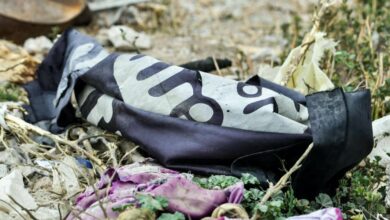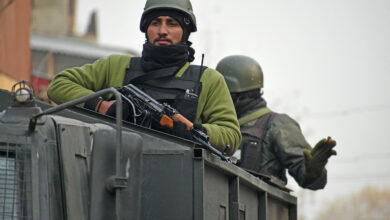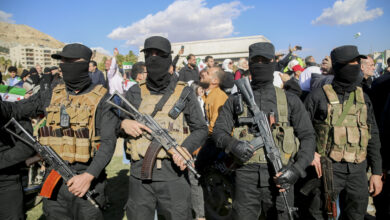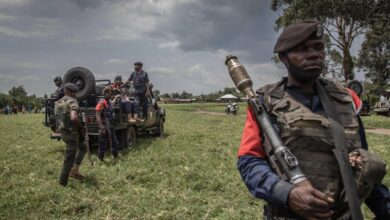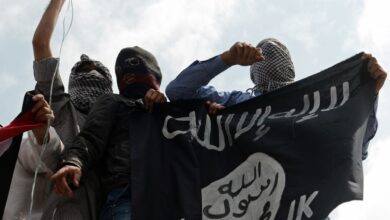Amaq claims ‘Islamic State fighters’ carried out Sri Lanka attacks
In a later statement, ISIS named seven people it said carried out the attacks
Islamic State fighters carried out the Easter Sunday attacks against churches and hotels in Sri Lanka that killed at least 310 people, according to ISIS’s Amaq propaganda agency.
“A security source to Amaq agency: the implementers of the attacks which targeted nationals of Coalition member nations and Christians in Sri Lanka the day before yesterday were from fighters of the Islamic State,” the message posted on social media on Tuesday, April 23 read.
At least 310 people were killed when suicide bomb blasts ripped through three hotels and three churches as worshippers attended Easter services in Sri Lanka.
In a later statement, ISIS named seven people it said carried out the attacks: Abu Hamza attacked St Anthony’s Church in Colombo; Abu Khalil struck St Sebastian’s in Negombo; Abu Muhammad hit the Church of Zion in Batticaloa; Abu Obaida, Abu al-Bara and Abu Mokhtar “detonated a number of explosive devices” and then detonated their explosive vests at the Shangri-La, Cinnamon Grand and Kingsbury hotels in Colombo; and Abu Abdallah “clashed with police officers and killed three” in Dematagoda.
That statement was followed by another release from Amaq which included an image it said was of the “perpetrators of martyrdom attacks in Sri Lanka.” The image showed eight similarly dressed individuals, some holding knives. One man whose face was not covered was holding an AK-type rifle.
The unmasked individual in the middle certainly looks like Zahran Hashim, the National Thowheed Jamaath ideologue who was fingered as the prime suspect by authorities early on.
— Thomas Joscelyn (@thomasjoscelyn) April 23, 2019
The unmasked man appears to be Zahran Hashim, a self-styled Islamic preacher who was known to hold pro-ISIS views. He was earlier named on social media accounts supportive of ISIS as Abu Obaida, one of the hotel bombers, and CNN News 18 on Sunday named him as the Shangri La Hotel bomber.

In fourth release on Tuesday, Amaq published a video showing the eight militants pledging allegiance to ISIS leader Abu Bakr al-Baghdadi.
Eight explosions across Sri Lanka
There were at least eight explosions on Sunday. The first six – at the churches and hotels – were within 20 minutes of each other, while two later blasts at a hotel and a house in a Colombo suburb came later.
Police have detained at least 40 people as they investigate the attacks.
At a Tuesday press conference, Prime Minister Ranil Wickremesinghe said that other suspects remained at large, potentially with explosives, adding that some of the 32 Sri Lankans who travelled to the Middle East to fight with ISIS had returned and have been monitored by security forces since.
Wickremesinghe said a bomb targeting another hotel did not explode.
Earlier on Tuesday, Sri Lanka’s state minister of defense Ruwan Wijewardene told parliament that “preliminary investigations have revealed that what happened in Sri Lanka was in retaliation for the attack against Muslims in Christchurch.”
Fifty people were killed in shooting attacks on two mosques in the New Zealand city of Christchurch on March 15.
But New Zealand has “not yet seen” any intelligence reports linking the deadly bombings in Sri Lanka to last month’s mosque massacre in Christchurch, Prime Minister Jacinda Ardern’s office said on Tuesday.
“We understand the Sri Lankan investigation into the attack is in its early stages,” Ardern’s spokesperson said. “New Zealand has not yet seen any intelligence upon which such an assessment might be based.”
Wijewardene said investigations showed that a local group called National Thowheeth Jama’ath (NTJ) was behind the attack and was linked to a little-known radical Islamist group in India.
“This National Thowheeth Jama’ath group which carried out the attacks had close links with JMI it has now been revealed,” Wijewardene told parliament, in an apparent reference to a group known as Jamaat-ul-Mujahideen India.
Little is known about JMI, other than reports it was established last year and is affiliated to a similarly named group in Bangladesh.
‘Family cell’ targeted hotels
Police sources in Sri Lanka told AFP that the attackers who targeted two of the hotels hit Sunday were brothers, sons of a wealthy Colombo spice trader.
The brothers, whose names have not been revealed, were in their late twenties and operated their own “family cell,” an investigation officer said, adding that they were key members of the NTJ.
One checked into the Cinnamon Grand hotel and the other the Shangri-La on Saturday.
The next morning, at virtually the same time, they went to the hotels’ Easter Sunday breakfast buffets and blew up explosives-laden backpacks, an investigation officer said.
One brother gave false identity details when he checked into the hotel, the investigator said, but the other gave a real address which led police commandos to their family home in a commercial area of Colombo.
“When the Special Task Force went there to investigate, one brother’s wife set off explosives killing herself and her two children,” the officer said.
“It was a single terror cell operated by one family,” the investigator said.
“They had the cash and the motivation. They operated the cell and it is believed they influenced their extended family.”
Three police commandos were also killed in the blast, and several extended family members are among those in detention.
A fourth attack against another hotel failed, sources also told AFP, though it was not immediately clear if the bomber’s explosives had failed or he had chosen not to detonate them.
“This man had also checked into the hotel the previous day,” an official source told AFP.
But after the Shangri-la blast, staff became suspicious and the man was tracked to a residence near the capital. He blew himself up when confronted by police, the source said. Two bystanders were also killed.
With reporting from AFP. This post was updated on April 23.




